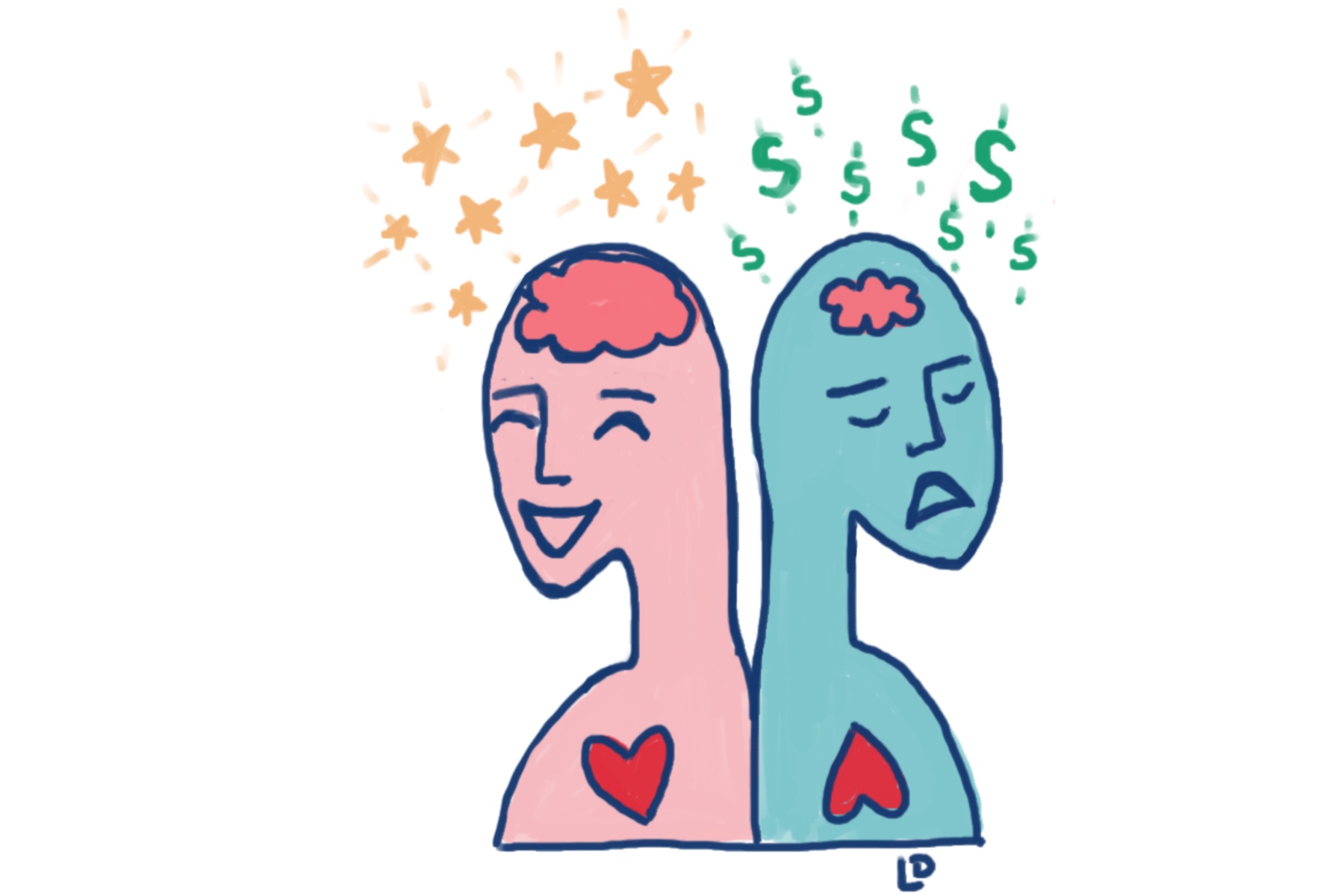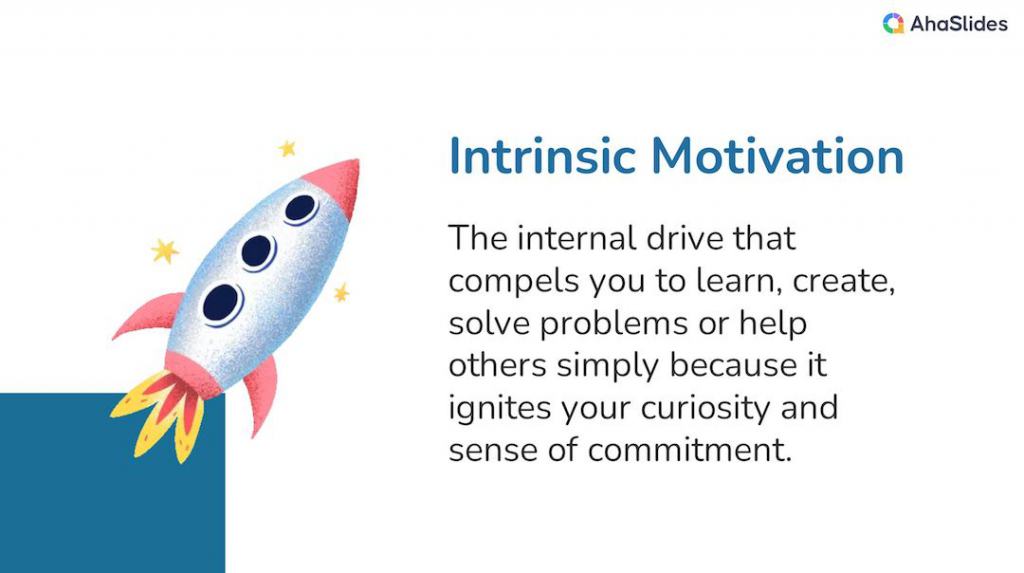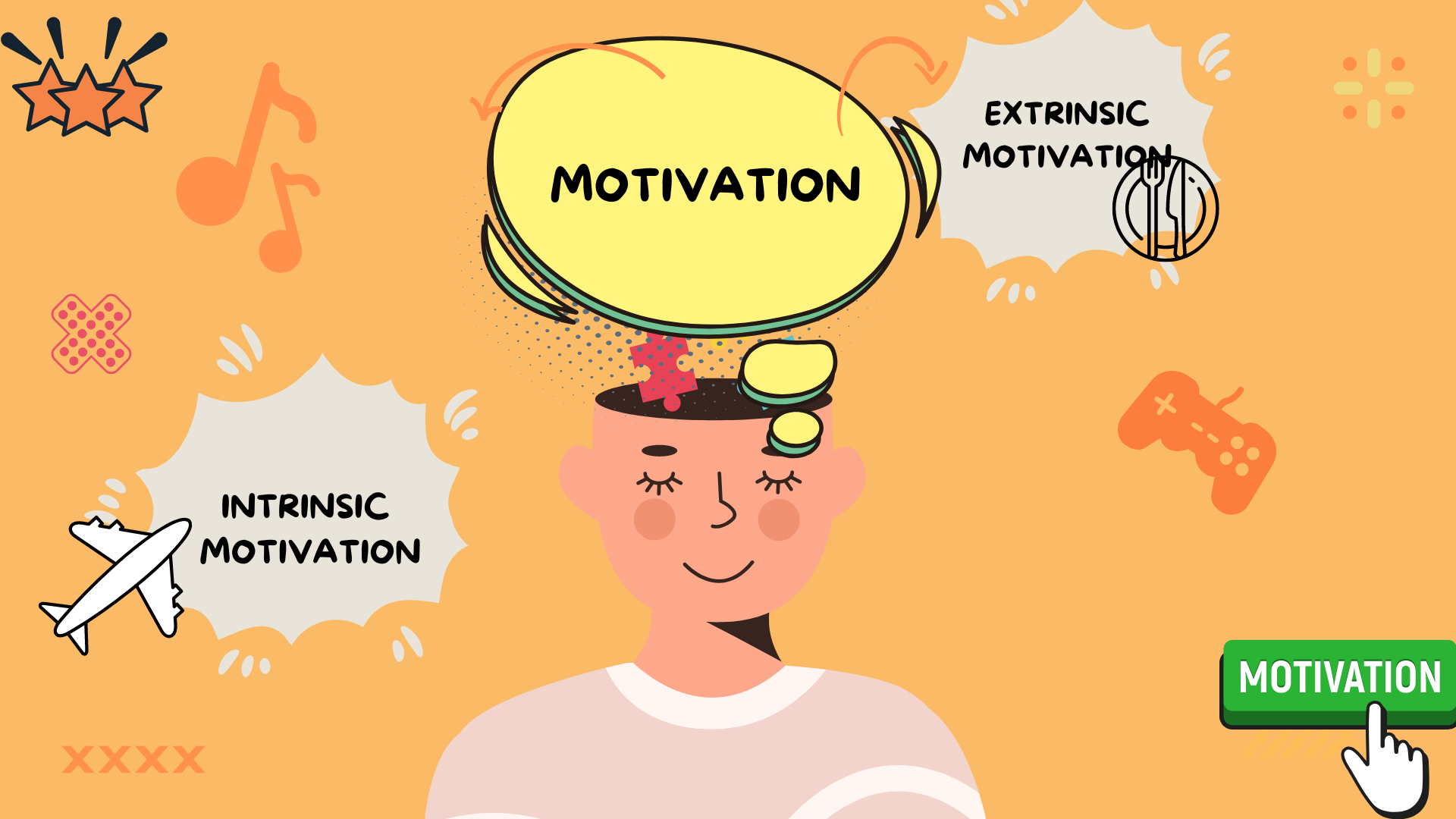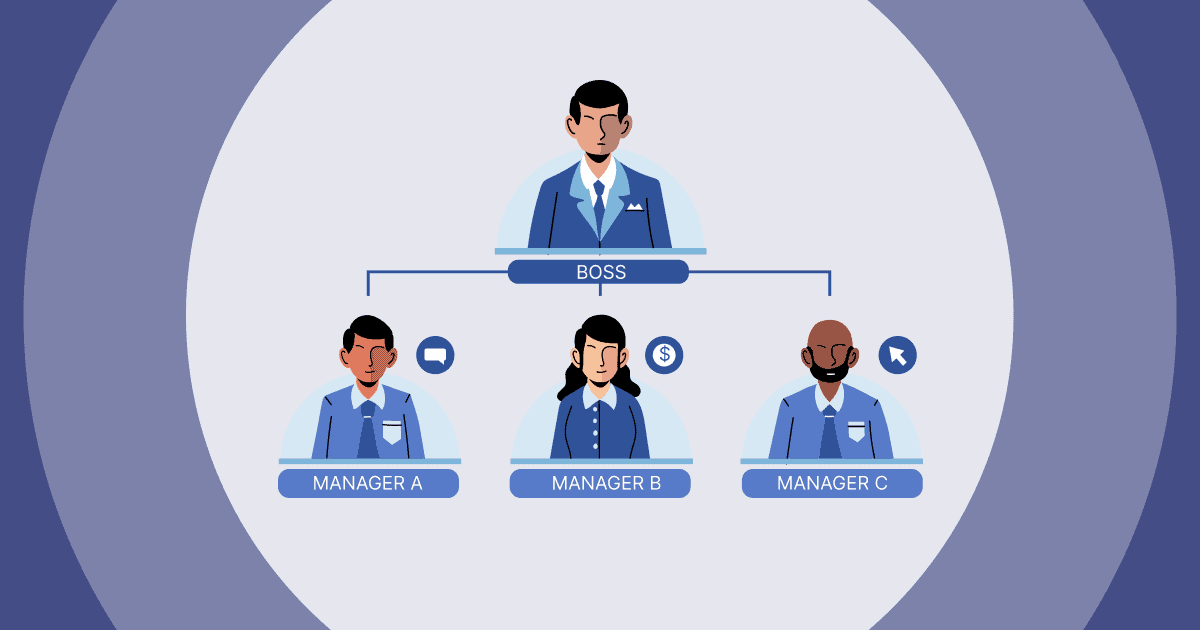有沒有想過為什麼有些人似乎天生就有學習和進步的動力,不斷接受新的挑戰,而沒有獎金或讚美等外在獎勵?
這是因為他們有內在的動力。
內在動機 是內心的火焰,促使我們去尋找困難的任務並承擔責任,不是為了給別人留下深刻的印象,而是為了我們自己的成就。
在這篇文章中,我們將探討內在動力背後的研究,以及如何激發那種迫使你為了學習而學習的動力。

目錄
Overview
| 誰提出了「內在動機」這個詞? | 德西和瑞安 |
| 「內在動機」一詞是什麼時候產生的? | 1985 |
提高參與度的技巧
內在動機 定義

內在動機 指來自個人內在的動機,而不是來自任何外在或外在的獎勵、壓力或力量。
這是內部的 駕駛 它迫使你學習、創造、解決問題或幫助他人,因為它激發了你的好奇心和承諾感。
它需要滿足三個需求──自主性、能力和關聯性。例如,擁有選擇權和個人參與感(自主性)、適度的挑戰(能力)以及社會連結(關聯性)。
培養內在動機比僅僅依賴外部獎勵更有利於學習、個人成長、整體工作滿意度和績效。
內在動機與外在動機

外在動機與內在動機相反,它是一種外在力量,迫使你為了避免懲罰或獲得獎勵(例如金錢或獎品)而去做某事。讓我們來看看內在動機和外在動機之間的主要差異:
| 內在動機 | 外在動機 | |
| Overview | 來自個體內部 受興趣、享受或挑戰感驅動 進行某項活動的原因本質上是有益的 動機獨立持續,無需外在獎勵或約束 | 來自個人以外 受到對獎勵的渴望或對懲罰的恐懼的驅使 進行某項活動的原因與活動本身是分開的,例如獲得好成績或獎金 動機取決於外在獎勵和持續的約束 |
| 專注於 | 注重活動本身的內在滿意度 | 更專注於外部目標和獎勵 |
| 性能效果 | 通常會帶來更高的概念學習、創造力和任務參與度 | 提升簡單/重複性任務的表現,但會削弱創造力和解決複雜問題的能力 |
| 長期影響 | 促進終身學習和自然的個人成長 | 如果獎勵結束,僅依賴外在激勵因素可能無法促進自我導向行為 |
| 包機成本結構範例 | 由於好奇心而從事有趣的項目 | 為了獎金而加班 |
內在動機的影響

你是否曾發現自己如此專注於一個專案或活動,以至於時間彷彿轉眼間就過去了?你處於一種純粹專注和心流的狀態,沉浸在挑戰之中。這就是內在動力在工作中的力量。
當你真正因為感興趣或感到滿足而投入某件事,而不是為了外在的獎勵時,你的創造力和解決問題的能力就會飆升。你的表現不再是達到目的的手段──它本身就是目的。
結果,具有內在動機的人會進一步拓展自己。 他們解決更困難的問題只是為了獲得征服的快感。 他們無所畏懼地探索新想法,不用擔心失敗或判斷。 這比任何激勵計劃都能帶來更高品質的工作。
更好的是,內在驅動力在深刻的層面上激發了對學習的自然渴望。 它將工作或學習從瑣事轉變為終生的熱情。 內在任務可以激發好奇心,從而提高記憶力並幫助技能堅持下去。
促進內在動機的因素

當你充分了解影響內在動機的因素時,你就可以正確地制定周密的計畫來填補缺失的內容並強化現有的內容。 這些因素是:
• 自主-當你掌控自己的決定和方向時,它會點燃你內在的火花,讓你飛得更高。擁有自由的選擇權,規劃你的方向,並共同駕駛目標,讓這份內在的動力驅使你走得更遠。
• 精通與能力-接受挑戰,既能挑戰極限,又能讓你精疲力竭,這會激發你的動力。隨著你透過練習累積專業知識,回饋會激勵你不斷進步。達到新的里程碑,會激發你進一步磨練自身能力的動力。
• 目標與意義-當你理解自己的才能如何推進有意義的使命時,內在驅動力將發揮最大的推動力。看到微小努力產生的影響,會激勵你為心之所向的事業做出更大的貢獻。

• 興趣與享受-沒有什麼比興趣更能激發你的好奇心。當各種選擇滋養你的自然奇觀和創造力時,你內心的熱情將無盡湧動。激勵性的嘗試讓興趣引領你探索新的天空。
• 正向的回饋與認同-正向的鼓勵而非負向評價能夠增強內在動機。對付出而非僅僅對結果的讚揚能夠提升士氣。紀念里程碑,讓每一次成就都成為你下一次起飛的跑道。
• 社交互動與協作-我們與志同道合的夥伴攜手共進,共同追求卓越。攜手共贏,滿足社會需求。支持網絡增強了我們持續追求卓越目標的動力。
• 清晰的目標和進度追蹤-內在動力在清晰的導航下運作最為順暢。了解目的地並提前監控,讓您充滿信心地出發。目標明確的路線,讓內在導航指引您攀登璀璨的天空。用這份問卷衡量您的內在動機
這份問卷有助於判斷你是否有內在動機。定期自我反思有助於識別哪些活動是由內在動力自然激發的,哪些活動依賴外在激勵。
每項陳述,請以 1-5 分的等級對自己進行評分:
- 1 – 一點都不像我
- 2 – 有點像我
- 3 – 比較像我
- 4 – 非常像我
- 5 – 極度像我
1. 興趣/享受
| 1 | 2 | 3 | 4 | 5 | |
| 我發現自己在空閒時間做這項活動,因為我非常喜歡它。 | ☐ | ☐ | ☐ | ☐ | ☐ |
| 這項活動為我帶來了快樂和滿足感。 | ☐ | ☐ | ☐ | ☐ | ☐ |
| 做這項活動時我感到興奮和全神貫注。 | ☐ | ☐ | ☐ | ☐ | ☐ |
#2 –挑戰和好奇心
| 1 | 2 | 3 | 4 | 5 | |
| 我強迫自己學習與這項活動相關的更複雜的技能。 | ☐ | ☐ | ☐ | ☐ | ☐ |
| 我很好奇探索開展這項活動的新方法。 | ☐ | ☐ | ☐ | ☐ | ☐ |
| 我對這項活動的難題或未解決的問題感到有動力。 | ☐ | ☐ | ☐ | ☐ | ☐ |
3. 自主意識
| 1 | 2 | 3 | 4 | 5 | |
| 我覺得我可以自由地調整我的方法來適應這項活動。 | ☐ | ☐ | ☐ | ☐ | ☐ |
| 沒有人強迫我做這個活動——這是我自己的選擇。 | ☐ | ☐ | ☐ | ☐ | ☐ |
| 我對自己參與這項活動有一種掌控感。 | ☐ | ☐ | ☐ | ☐ | ☐ |
#4 – 進步與精通
| 1 | 2 | 3 | 4 | 5 | |
| 我對自己與這項活動相關的能力感到有能力和信心。 | ☐ | ☐ | ☐ | ☐ | ☐ |
| 隨著時間的推移,我可以看到我的技能在這項活動中得到了提升。 | ☐ | ☐ | ☐ | ☐ | ☐ |
| 在這項活動中實現具有挑戰性的目標是令人滿意的。 | ☐ | ☐ | ☐ | ☐ | ☐ |
#5 –重要性與意義
| 1 | 2 | 3 | 4 | 5 | |
| 我發現這項活動與個人相關且重要。 | ☐ | ☐ | ☐ | ☐ | ☐ |
| 做這個活動對我來說很有意義。 | ☐ | ☐ | ☐ | ☐ | ☐ |
| 我了解這項活動如何產生正面影響。 | ☐ | ☐ | ☐ | ☐ | ☐ |
6.回饋和認可
| 1 | 2 | 3 | 4 | 5 | |
| 我的努力或進步的正面回饋會激勵我。 | ☐ | ☐ | ☐ | ☐ | ☐ |
| 看到最終結果會激勵我繼續進步。 | ☐ | ☐ | ☐ | ☐ | ☐ |
| 其他人承認並讚賞我在這領域的貢獻。 | ☐ | ☐ | ☐ | ☐ | ☐ |
#7 –社交互動
| 1 | 2 | 3 | 4 | 5 | |
| 與他人分享這段經歷會增加我的動力。 | ☐ | ☐ | ☐ | ☐ | ☐ |
| 為一個共同的目標而共同努力讓我充滿活力。 | ☐ | ☐ | ☐ | ☐ | ☐ |
| 支持性關係增強了我對這項活動的參與。 | ☐ | ☐ | ☐ | ☐ | ☐ |
💡 使用 AhaSlides 的免費問卷調查功能,快速收集公眾意見 調查模板 – 隨時可用🚀
總結
所以,這篇文章的最後,我們想說的是──花點時間思考如何將你的工作和學習與你內心的熱情結合。並尋找方法,為他人提供自主權、回饋和人際關係,以點燃他們內心的熱情。
當動力源自於內在而非外在控制時,你會驚訝地發現,一切都有可能!
常見問題(FAQ)
什麼是內在動機和外在動機?
內在動機是指來自內在驅力和興趣的動機,而不是外在提示。 有內在動機的人會為了自己的利益而從事活動,而不是期待一些外在的回報。
內在動機的四個組成部分是什麼?
內在動機的四個組成部分是能力、自主性、關聯性和目的。
5個內在動機是什麼?
5 個內在動機是自主、掌握、目的、進步和社會互動。












